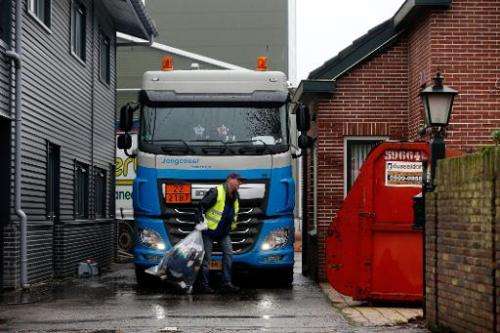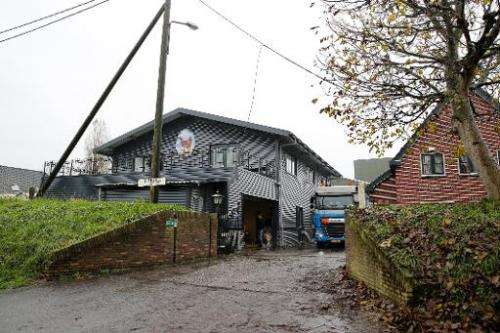'Contagious' bird flu outbreaks on Dutch, British farms (Update)

Dutch officials were on Monday checking poultry farms for a highly infectious strain of bird flu following outbreaks of similar strains of the virus in Britain and Germany.
Public health authorities on Sunday banned the transport of poultry throughout the Netherlands after the discovery in the village of Hekendorp of a "highly pathogenic" form of avian influenza that is very dangerous to birds and can contaminate humans.
The destruction of around 150,000 hens at the egg farm in Hekendorp, near Utrecht, should be completed on Monday, said Lex Denden of the Dutch Food and Consumer Product Safety Authority (NVWA).
The European Commission on Monday praised the Dutch and British response to the outbreaks amid warnings that the disease could spread further.
"We can only praise the behaviour of the authorities of the two member states," said Commission spokesman Enrico Brivio.
Same strain
A duck breeding farm in northern England was closed off on Monday after an outbreak of bird flu, although officials said the risk to public health was "very low".
An estimated 6,000 ducks on the farm will be culled and a 10-kilometre (six-mile) restriction zone has been put around the site near Driffield in Yorkshire.
Renowned virologist and bird flu expert Ron Fouchier said that British authorities had told European authorities that their virus is the same H5N8 strain as found in Germany earlier this month and now in the Netherlands.
"The UK virus is also similar to the German one, that would mean that it's the H5N8 strain," Fouchier told AFP.
An EU source told reporters that it is "most likely the same strain in all three places," the Netherlands, Britain and Germany.

The source said "more outbreaks would not be surprising" in countries such as France, Spain and Italy as the "disease might have come from swans migrating from north to south."
Health risk to humans
Dutch food authority spokesman Denden told AFP they were checking 16 farms in around a 10-kilometre (six-mile) radius from the infected farm.
He said that two farms in the immediate vicinity of the infected farm had already been given the all-clear.
Roadblocks have been set up around one kilometre from the village to prevent people not on official business from entering.
The atmosphere in the village was quiet on Monday, with police and black barriers screening off the infected farm amid fears of further outbreaks in Europe's biggest egg and poultry exporter.
Officials have identified the flu as being the H5N8 strain, previously detected only in Asia.
Several hundred thousand birds, mainly ducks, have been culled over the last two months because of a South Korean outbreak.
Some strains of avian influenza are fatal for chickens, and pose a health threat to humans, who can fall sick after handling infected poultry.
But Dutch authorities have said human infection can only occur following "intense and direct contact" with infected birds.
Virologist Fouchier of the Erasmus Medical Center in Rotterdam told AFP it was a mystery how the virus had reached the Netherlands.
"We have no idea where it's coming from," he said, noting that the flu had "popped up, out of nowhere, in farms without any poultry trade record with Asia".
Fouchier said that the infection likely came through wild waterbirds, such as ducks, geese or swans, that had migrated from Asia and left droppings near the Dutch farm.
"We can't really talk about a major return of the virus since it's a different strain than in 2005-06," he said.
The H5N1 strain of bird flu has killed more than 400 people, mainly in southeast Asia, since first appearing in 2003. Another strain of bird flu, H7N9, has claimed more than 170 lives since emerging in 2013.
Countrywide ban
According to Dutch media, the H7N7 strain of avian flu severely hit the Netherlands in 2003 with health authorities destroying some 30 million birds in an effort to quash an outbreak.
There are some 95 million chickens kept on Dutch poultry farms and egg exports totalled some 10.6 billion euros ($13.2 billion) in 2011, according to the latest Dutch statistics.
© 2014 AFP















